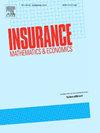平均分摊和分担长寿风险,又称 "管理人能否帮助猫剥皮"?
IF 2.2
2区 经济学
Q2 ECONOMICS
引用次数: 0
摘要
本文关注的是在参与者的财富(缴费)和健康(死亡率)都不同的情况下,尤其是当这些群体的规模相对较小时,如何分配与长寿挂钩的基金赔付的数学问题。换句话说,我们提供了一个模型框架,用于在参与人异质性的情况下分配长寿风险池的收入和收益(或 "通廷奖")。与有关分散风险分担(DRS)的新兴文献类似,在幸存者之间分配收益(又称 "剥通廷猫皮")也有几种同样合理的安排。我们认为,所选择的规则可能取决于长寿风险池中社会凝聚力的程度,从团结和利他主义到纯粹的个人主义。而且,如果精算公平是一个问题,我们建议引入一个管理人--不同于担保人--来使长寿风险池的支付集体精算公平。所谓公平,是指参与人平均获得的收益与他们集体投资的收益相同;我们提供了实现这一建议的数学框架。有一点是肯定的:精算学无法为与长寿相关的索赔提供设计上的独特性,只能提供一致的方法。本文章由计算机程序翻译,如有差异,请以英文原文为准。
Egalitarian pooling and sharing of longevity risk a.k.a. can an administrator help skin the tontine cat?
This paper is concerned with the mathematical problem of allocating longevity-linked fund payouts in a pool where participants differ in both wealth (contributions) and health (mortality), particularly when these groups are relatively small in size. In other words, we offer a modelling framework for distributing longevity-risk pools' income and benefits (or “tontine winnings”) when participants are heterogeneous. Similar to the nascent literature on decentralized risk sharing (DRS), there are several equally plausible arrangements for sharing benefits (a.k.a. “skinning the tontine cat”) among survivors. We argue that the selected rule may depend on the extent of social cohesion within the longevity risk pool, ranging from solidarity and altruism to pure individualism. And, if actuarial fairness is a concern, we suggest introducing an administrator – which differs from a guarantor – to make the tontine pool payouts collectively actuarial fair. Fairness is in the sense that the group of participants will on average receive the same benefits as they collectively invested; and we provide the mathematical framework to implement that suggestion. One thing is for certain: actuarial science cannot offer design uniqueness for longevity-contingent claims; only a consistent methodology.
求助全文
通过发布文献求助,成功后即可免费获取论文全文。
去求助
来源期刊

Insurance Mathematics & Economics
管理科学-数学跨学科应用
CiteScore
3.40
自引率
15.80%
发文量
90
审稿时长
17.3 weeks
期刊介绍:
Insurance: Mathematics and Economics publishes leading research spanning all fields of actuarial science research. It appears six times per year and is the largest journal in actuarial science research around the world.
Insurance: Mathematics and Economics is an international academic journal that aims to strengthen the communication between individuals and groups who develop and apply research results in actuarial science. The journal feels a particular obligation to facilitate closer cooperation between those who conduct research in insurance mathematics and quantitative insurance economics, and practicing actuaries who are interested in the implementation of the results. To this purpose, Insurance: Mathematics and Economics publishes high-quality articles of broad international interest, concerned with either the theory of insurance mathematics and quantitative insurance economics or the inventive application of it, including empirical or experimental results. Articles that combine several of these aspects are particularly considered.
 求助内容:
求助内容: 应助结果提醒方式:
应助结果提醒方式:


